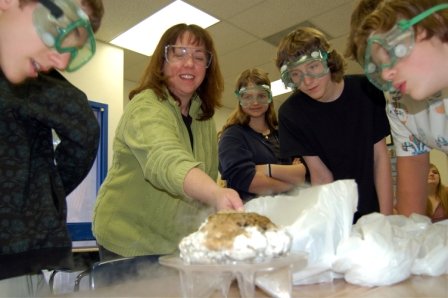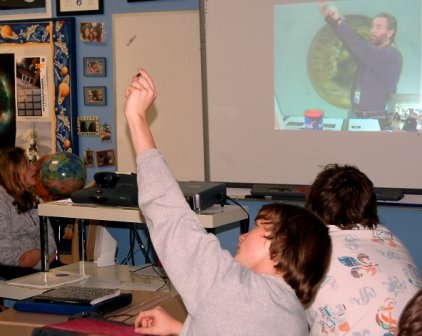[et_pb_text admin_label="PJ Kezele byline; remember to tag post as various-contributors" saved_tabs="all" background_layout="light" text_orientation="left" header_font="Arimo||||" text_font="||on||" use_border_color="off" border_color="#ffffff" border_style="solid"]
Key Peninsula Middle School’s science and math program received a boost the first week of June when the school was named one of six 2008 Intel Schools of Distinction. KPMS was selected as the best middle school in the nation for science excellence from among hundreds of applicants nationwide. The annual program honors schools for implementing innovative and replicable math and science programs that produce positive educational results.
 Making a model of a comet are, l-r, Alex Chandler, teacher Kareen Borders, Mariah Roberts, Loren Bonner and Devon Kennedy. Photo by Mindi LaRose
Making a model of a comet are, l-r, Alex Chandler, teacher Kareen Borders, Mariah Roberts, Loren Bonner and Devon Kennedy. Photo by Mindi LaRose
“Each winning school has achieved academic excellence in math and science by embracing such 21st century learning skills as digital literacy, critical thinking and problem solving, as well as teamwork and community involvement,” said Brenda Musilli, Intel Corp. director of education. “Math and science skills are more important than ever, both to an individual’s success and our country. We honor these exemplary schools for their excellence in serving as role models to educational institutions across the nation.”
The school will receive a $10,000 grant from Intel and an award package that includes curriculum materials, professional development resources, hardware and software valued at more than $160,000. Award sponsors include Dell, DyKnow, eInstruction, Futurekids, Scantron, SMART Technologies and SpectrumK12.
Kareen Borders, who teaches sixth- and eighth-grade science and led KPMS’ NASA Explorer School team, said the school “will not find out what is in the technology package until the awards ceremony in September.”
“At that point, we will put together a small committee that will decide how the equipment can best be distributed to have the greatest impact on student learning,” she said. “This process will be systematic, aligned with our KPMS vision and will reflect the input and participation of staff.”
 KPMS eighth grader Robert Casey holds a “dime to the sky” as he was asked to do by Steve Biles of Jet Propulsion Laboratory/NASA. KPMS students interacted via video conferencing with Biles, who was located in California at NASA's JPL. A rotating camera and microphones were set up in the classroom, which allowed the students to also be seen and heard by the speaker. Photo by Mindi LaRose
KPMS eighth grader Robert Casey holds a “dime to the sky” as he was asked to do by Steve Biles of Jet Propulsion Laboratory/NASA. KPMS students interacted via video conferencing with Biles, who was located in California at NASA's JPL. A rotating camera and microphones were set up in the classroom, which allowed the students to also be seen and heard by the speaker. Photo by Mindi LaRose
This newest award piggybacks on the school’s three-year partnership with NASA as an Explorer School from 2004 to 2007. One goal of the NASA program is for schools to build relationships with other programs and agencies that can further support the school’s goals of STEM (science, technology, engineering and math) education. According to Borders, KPMS has actively sought partnerships to sustain all components of the original program.
“We have partnerships with Museum of Flight, American Institute of Aeronautics and Astronautics, Spitzer Space Telescope, Mauna Kea Observatories, McChord Air Force Base, Starbucks, Albertsons, Angel Guild, Washington Space Grant Consortium, Tacoma Astronomical Society, Olympia Astronomical Society, University of Washington and many others,” Borders said. “These partnerships help with mentors, guest speakers, grant funds and more.”
Intel evaluated each competing school based on providing hands-on investigative experiences, incorporating a variety of instructional strategies and meeting rigorous education industry standards and assessment benchmarks, such as the Information and Communication Technology literacy maps developed by the Partnership for 21st Century Skills.
According to Intel’s Website, KPMS was honored for making “dramatic changes in student achievement and engagement in science, science achievement upon entering high school and family participation in science.” “The school’s science achievement scores have improved from 26.1 percent to 41.5 percent over the past four years,” the Website stated. “All training, mentoring and coaching is data-driven and is done through the lens of ‘what is best for the students?’”
“I think that our Science Department commitment to student-focused learning, science taught across curricular areas (i.e. language arts and math), the NASA focus, high district standards and inquiry-driven lessons have significantly impacted our science scores,” Borders said.
Representatives from KPMS will attend an awards celebration in Washington, D.C., on Sept. 9, where one Star Innovator will be announced. The winning school will receive an additional $15,000 grant and additional products and services, bringing the Star Innovator award to more than $200,000.
UNDERWRITTEN BY THE FUND FOR NONPROFIT NEWS (NEWSMATCH) AT THE MIAMI FOUNDATION, THE ANGEL GUILD, ADVERTISERS, DONORS AND PEOPLE WHO SUPPORT INDEPENDENT, NONPROFIT LOCAL NEWS